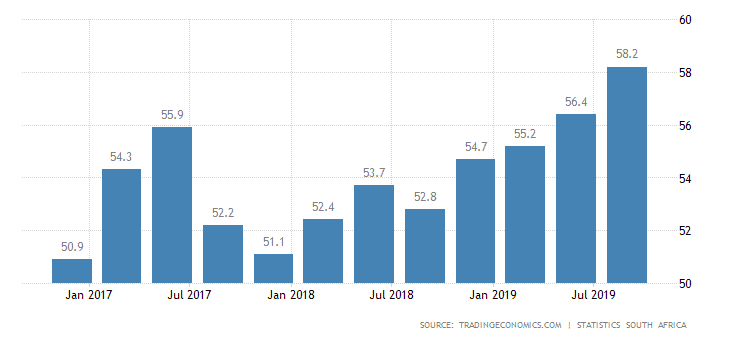A critical skills shortage in digital marketing could mean job opportunities for 2020 school leavers

Why School Leavers will battle to find a job
As the class of 2019 are released into the big wide world of work, many parents are holding their breath, hoping that by some miracle their school leaver finds employment and start a successful career. Sadly, according to an unemployment report released by Statistics South Africa (Stats SA), youth’s (15 to 24) are far less likely to find a job or to be absorbed in the job market than those that are older. There is a general belief that total lack of experience counts against them and firms would rather employ older people who have more work experience. It is therefore not surprising that the youth unemployment rate in South Africa rose significantly to 58.2 percent in the third quarter of 2019, reaching its highest level since the first quarter of 2008.

Dalein van Zyl, CEO of IMM Graduate School says, “with this pressure on parents and households, the obvious next step is to look to tertiary education to solve the problem. Unfortunately, only 33.6% of candidates (2018), who wrote the NSC examinations received a bachelor pass and were eligible for studies at higher education institutions. In addition, unless the programme of study is highly practical in nature, jobs are still hard to come by. The industry wants graduates that are job-ready.”
It is critically important for parents of school leavers to identify where the biggest skills gaps are and then get their school leavers upskilled (with experience) in one of these areas as quickly as possible.
The world has gone digital
The world as we know it is changing, with one common element driving everything – digital transformation! Businesses can no longer ignore the fact that digital technology is the key to future success and therefore are constantly on the lookout for people that have a talent and skills in digital technology.
Parents should therefore be looking at careers for their school leavers that involve some sort of digital technology if they want them to even be considered for future employment, globally. One of the fastest growing industries in the world today is digital marketing – the science of knowing where to find customers online, how to develop a relationship with them and how to communicate with them in a meaningful, efficient and effective manner. For a while now those in the digital marketing industry have taken note of an escalating skills shortage. Digital marketing skillsets are in high demand, but ultimately in short supply.
There has never been a better time for school leavers to develop a digital marketing skillset
In a recent global survey published by The Economist Group, research from across nine countries highlights an alarming shortage of critical skills and talent within the digital marketing space. Interviews with more than five hundred international marketing executives, reveals that 74% of marketing executives believe their industry faces a critical talent shortage of digital marketing experience and soft skills needed to meet customers’ increasing demands. Areas of ‘customer experience’, ‘strategy and planning / brand management’ and ‘data and analytics’ were identified as crucial to an organisations’ success and business performance. The survey further points out that many of these marketers will need to place a strong emphasis on recruitment, meaning they are on the lookout for new, young talent with verifiable skills. According to the report, securing talent with the right skill set is the most cited challenge faced by marketers today.
“There has never been a better time for school leavers to develop a digital marketing skillset. That’s why we set out to understand what skills are required for entry into this industry and developed a 12 month skills focused course that could both address the skills gap and solve (to some extent) the unemployment issues that school leavers are facing,” added van Zyl.
Practical skills valued over credentials
One of the challenges in the industry it seems is that digital marketers tend to be too specialised and there is a need for candidates to have a broader understanding of the digital marketing landscape and overarching strategies. “Furthermore, 60% of digital marketing executives we surveyed indicated that they did not care whether or not a candidate had a three year degree and were happy to accept someone with a Diploma, Higher Certificate or even an online short course, as long as they had the skills to do the job,” adds van Zyl.
Successful candidates are chosen for their ability and understanding of basic design and content creation, this means having practical skills such as copywriting and blogging abilities, knowledge of research techniques such as keyword research, blog topic research, social monitoring and clickstream analysis and an understanding of top of funnel versus bottom of funnel strategy and tactics. The need gets even broader where candidates need an understanding of marketing fundamentals and useable knowledge in SEO, segmentation and targeting, various testing strategies, reporting and analysis using online tools such as google analytics. The marriage of creativity and analytical thinking is central in today’s landscape of digital marketing.
“After assessing the feedback received from industry it became apparent that we had to develop youths with generalist skills and that their specialisation would happen later – through on-the-job training – or more formal education channels.
With this understanding in hand we proceeded to develop what we believe to be the best and most relevant 12-month certificate course in Applied Digital Marketing”, added van Zyl.
Equipping school leavers with practical digital marketing skills.
This course is an online blended learning course with interactive content, webinars, gamification and one-on-one coaching with industry experts. The intention of this course is to provide students with knowledge and then get them to apply the knowledge in order to develop specific skills that are aligned to industry requirements. All of this culminates into a hands-on, skills-based portfolio whereby students can showcase their ‘experience’ to the industry, hence improving their chances of employment. While this course has been designed to specific industry requirements for minimum entry as a junior digital marketer, it’s also ideal for those already in the industry wanting to broaden their knowledge and future-proof their careers.
Included are eight learning blocks and one overarching portfolio project where students will
- build and manage social media business pages on Facebook, LinkedIn, Instagram, Twitter and YouTube,
- design and create content for social media using online tools,
- apply basic writing skills for online copy and blogging
- apply online research techniques including keyword research, blog topic research, social monitoring and clickstream analysis
- develop a good understanding of how to plan and implement SEO strategies and create content for search ranking purposes,
- gain skills in building reports and interpreting data from google analytics and other social media insights tools,
- build a basic website using Wix,
- Learn how to navigate the backend of a WordPress site,
- utilise online tools in the Google Suite such as Gmail, Google Drive and Google Docs,
- use Mailchimp to create email campaigns,
- leverage tools like Grammarly to typo proof copy,
- understand and use HubSpot as an online CRM tool,
- use tools such as Hootsuite or Buffer as a social media management tool.
- understand the in’s and out’s of PPC (pay-per-click) advertising,
- know how to use tools like Google Ads and Wordstream.
Portfolio of evidence
“This course won’t just leave students with an impressive paragraph on their CV, it will also give them an extensive portfolio of evidence demonstrating their new digital marketing skills,” ends van Zyl.
Interested candidates can get a more detailed breakdown of this course here. If you have any questions, please feel free to contact the IMM Graduate School on 0861 466 476.
